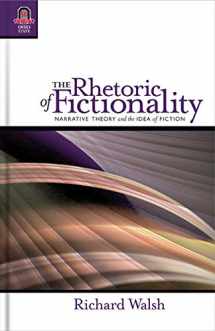
The Rhetoric of Fictionality: Narrative Theory and the Idea of Fiction
ISBN-13:
9780814291467
ISBN-10:
0814291465
Edition:
1
Author:
Richard Walsh
Publication date:
2007
Publisher:
Ohio State Univ Pr
Format:
CD-ROM
FREE US shipping
Book details
ISBN-13:
9780814291467
ISBN-10:
0814291465
Edition:
1
Author:
Richard Walsh
Publication date:
2007
Publisher:
Ohio State Univ Pr
Format:
CD-ROM
Summary
The Rhetoric of Fictionality: Narrative Theory and the Idea of Fiction (ISBN-13: 9780814291467 and ISBN-10: 0814291465), written by authors
Richard Walsh, was published by Ohio State Univ Pr in 2007.
With an overall rating of 3.6 stars, it's a notable title among other
books. You can easily purchase or rent The Rhetoric of Fictionality: Narrative Theory and the Idea of Fiction (CD-ROM) from BooksRun,
along with many other new and used
books
and textbooks.
And, if you're looking to sell your copy, our current buyback offer is $0.33.
Description
Narrative theory has always been centrally concerned with fiction, yet it has tended to treat fictions as if they were merely the framed or disowned equivalents of nonfictional narratives. A rhetorical perspective upon fictionality, however, sees it as a direct way of meaning and a distinct kind of communicative gesture. The Rhetoric of Fictionality: Narrative Theory and the Idea of Fiction by Richard Walsh argues the merit of such a perspective and demonstrates its radical implications for narrative theory. A new conception of fictionality as a distinctive rhetorical resource, somewhat like the master-trope of fictional narrative, cuts across many of the core theoretical issues in the field. The model, set out in chapter one, is subsequently tested and elaborated in relation to currently prevalent assumptions about narrativity and mimesis; narrative structure; the narrator and transmission; voice and mediacy; narrative media and cognition; and creativity, reception, and involvement. Throughout, the theoretical analysis seeks to vindicate readers’ intuitions about fiction without merely restating them: the result is a forceful challenge to many of narrative theory’s orthodoxies. The rhetorical model of fictionality advanced in this book offers up new areas of inquiry into the purchase of fictiveness itself upon questions of narrative interpretation. It urges a fundamental reconception of the apparatus of narrative theory by theorizing the conditions of significance that make fictions conceivable and worthwhile.


We would LOVE it if you could help us and other readers by reviewing the book
Book review

Congratulations! We have received your book review.
{user}
{createdAt}
by {truncated_author}


